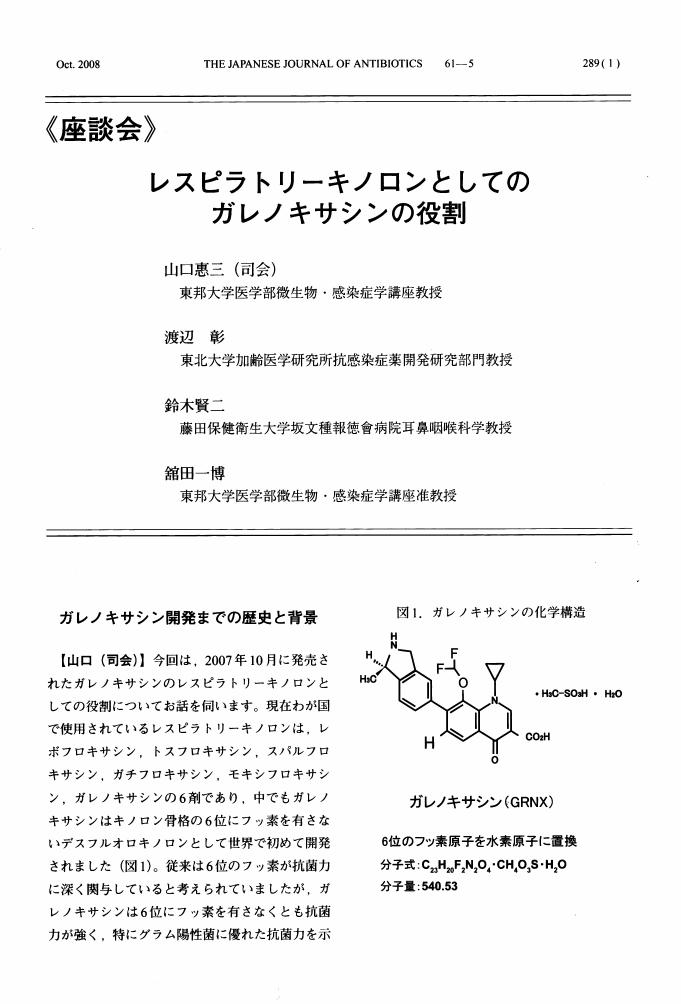1 0 0 0 IR 母子分離された母親への交換ノート導入後の看護師調査
- 著者
- 山口 恵 笠原 里香 小笠原 詩子 黒澤 菜穂美
- 出版者
- 松田 壯正
- 雑誌
- 盛岡赤十字病院紀要 = Medical Journal of Japanese Red Cross Morioka Hospital (ISSN:13412612)
- 巻号頁・発行日
- vol.25, no.1, pp.148-150, 2016-08-31
1 0 0 0 OA Tazobactam/Piperacillinの細菌学的評価
- 著者
- 三宅 美行 宮崎 修一 辻 明良 金子 康子 山口 恵三 五島 瑳智子
- 出版者
- 公益社団法人 日本化学療法学会
- 雑誌
- CHEMOTHERAPY (ISSN:00093165)
- 巻号頁・発行日
- vol.42, no.Supplement2, pp.34-50, 1994-10-24 (Released:2011-08-04)
- 参考文献数
- 17
新しいβ-ラクタマーゼ阻害剤tazobactam (TAZ) とpiperacillin (PIPC) との1: 4の配合剤で あるtazobactam/piperacillin (TAZ/PIPC) のin vitroおよびin vivoにおける抗菌力を既存のβ-ラクタム系抗生物質と比較検討した。TAZ/PIPCはグラム陽性菌および陰性菌に対して幅広い抗菌スペクトルを示し, 陽性菌 では対照薬剤のなかで最も強く, 陰性菌においてもimipenem, ceftazidimeにつぐ強い抗菌 力を示した。特にβ-ラクタマーゼ産生株では配合相手であるPIPCよりも強い抗菌力を示 した。マウス全身感染治療実験において TAZ/PIPCは試験株のすべてに優れた治療効果を認 め, とくにβ-ラクタマーゼ産生株の感染ではPIPCよりも優れた治療効果を示した。また, TAZ/PIPCのβ-ラクタマーゼ非産生株単独感染での治療効果はPIPCとほぼ同様であったが, 産生株との混合感染においては明らかにPIPCより優れていた。β-ラクタマーゼ産生株であるEscherichia coli KU-3によるマウス尿路感染治療実験で, TAZ/PIPC投与マウスは PIPC投与マウスに比較して速やかな腎内生菌数の減少が観察された。また, 同様の方法にて尿路感染時の腎内PIPC濃度を測定したところ, PIPC投与群ではβ-ラクタマーゼによる分解を受けPIPC濃度はTAZ/PIPC投与群より有意に低下していたが, TAZ/PIPC投与群は正常マウスとほぼ同様であり, 分解を受けなかった。さらに, 臨床治療時を想定したヒト血中濃度シミュレーションシステムを用いてTAZ/PIPCの殺菌効果をβ-ラクタマーゼ産生株についてPIPCと比較したところ, TAZ/PIPCは PIPCより著明な生菌数の減少と再増殖の遅延が認められた。またE. coliとKlebsiella Pneumoniaeの混合接種においてもTAZ/PIPCはPIPCと比べ両菌に対し著明な殺菌作用が認められた。混合感染などβ-ラクタマーゼ産生株による感染治療においてTAZ/PIPCが優れた治療効果を示したのは, 感染部位に産生されたβ-ラクタマーゼによるPIPCの分解をTAZが阻害するためPIPC本来の抗菌力が発揮されたことによると考えられた。
- 著者
- 山口 恵子 小島 理沙 石川 雅紀
- 出版者
- 環境科学会
- 雑誌
- 環境科学会誌 = Environmental science (ISSN:09150048)
- 巻号頁・発行日
- vol.23, no.5, pp.375-380, 2010-09-30
- 被引用文献数
- 1
2007年2月、神戸市に立地するコープ六甲アイランド店にて、"「ごみ減量」市民の大実験!!簡易包装を買おうプロジェクト"が実施された。このプロジェクトでは、神戸大学の学生を中心とした特定非営利活動法人ごみじゃぱん(Gomi-jp)が、店舗内の食料品や生活雑貨品から包装ごみの少ない推奨商品を選定し、店頭広告・チラシ・イベントなど様々なメディアを用いて生活者に簡易包装商品の情報を発信した。本研究では、この実験で用いられたパブリックマーケティングアプローチ(PMA)に基づく減装(へらそう)ショッピングによって、簡易包装商品の需要に対してどのような影響を及ぼすのかをパネルデータモデルを用いて分析した。分析結果より、実験期間における生活雑貨品(推奨理由:詰め替え)カテゴリーの推奨商品の販売量はプラスの影響を受けていることが明らかにされた。さらに、実験期間を前半期間と後半期間に分けて分析した場合には、集中陳列棚を用いて効果的にアピールした後半期間にはプラスの効果が表れることが示された。結論として、PMAは容器包装ごみの発生抑制に有効であることが示された。
1 0 0 0 OA サーンキヤ哲学体系の基礎
- 著者
- 山口 恵照
- 出版者
- 大阪大学
- 雑誌
- 大阪大學文學部紀要 (ISSN:04721373)
- 巻号頁・発行日
- vol.5, pp.143-268, 1957-03-25
The system of the Samkhya-philosophy, which is inherent in the Samkhakarika text by Isvarakrisna, is one of the most excellent of the Brahmanical philosophies (darsana). What is the essential character of that system as a system of philosophy? This point has not been perfectly cleared up until now. The system of Samkhya-philosophy as one of the Indian philosophies should not be approached, says our writer, simply as a heretical philosophy according to the considerations given to the other world philosophies. This philosophy has hitherto been taken as representing dualism, atheism, realism, etc. But such a characterization is not fair and comprehensive, says Prof. Yamaguchi, as it is too sweeping a generalization. As a matter of fact, the Samkhya-philosophy made an attempt after its own manner to give a solution to the common problems of karma, samsara and moksa that commonly pertained to all the other classical Indian philosophies. We must therefore endeavour to clarify the fundamental principles of the Samkhya-philosophy by trying to study it as a composite whole without any prejudice. Prof. Yamaguchi has here ventured a new interpretation of the Samkhya-karika through a textual criticism of it and asserts that the system of Samkhya-philosophy embodies statement, definitions and exposition of the three fundamental principles which are respectively known as vyakta (mahadadi), avyakta (prakriti or pradhana) and purusa (jna). In the present article accordingly Prof. Yamaguchi treats of his subject under the following headings: I. Introduction. II. The System of the Samkhya-philosophy and its Logic (pramana). III. Exposition of vyakta, avyakta and purusa. IV. Conclusion.
1 0 0 0 OA レスピラトリーキノロンとしてのガレノキサシンの役割
- 著者
- 山口 恵三 渡辺 彰 鈴木 賢二 舘田 一博
- 出版者
- 公益財団法人 日本感染症医薬品協会
- 雑誌
- The Japanese Journal of Antibiotics (ISSN:03682781)
- 巻号頁・発行日
- vol.61, no.5, pp.289-302, 2008-10-25 (Released:2013-05-17)
1 0 0 0 IR 濃淡画像からペン画調画像への変換法 : 線描, 点描
- 著者
- 中川 大介 山口 恵介 藤本 忠博 村岡 一信 千葉 則茂
- 出版者
- 一般社団法人 画像電子学会
- 雑誌
- 画像電子学会誌 (ISSN:02859831)
- 巻号頁・発行日
- vol.30, no.4, pp.350-361, 2001-07-25
- 被引用文献数
- 2 4
近年, コンピュータグラフィックスにおいて非写実的なレンダリング法の研究が盛んに行われている. 本論文では, 挿し絵やテクニカルイラストレーションなどに用いられているペン画を取り上げ, 与えられた濃淡画像からペン画調画像を生成する手法について提案する. ペン画の基本的な技法には, 線で表す線描法と, 点の集まりで表す点描法がある. 線や点のサイズが表示デバイスの解像度に依存していると, 低解像度のデバイス(モニタなど)では線や点が連結して模様が認識されるアーティファクトの発生がさけられない. 本手法では線描の画像生成に1/fノイズによる揺らぎを与えた平滑化直線と呼ぶ濃度分布を持つ直線を用い, 点描の画像生成に平滑化点と呼ぶ濃度分布を持つ点を用いることでアーティファクトの発生を低減させることできる.


